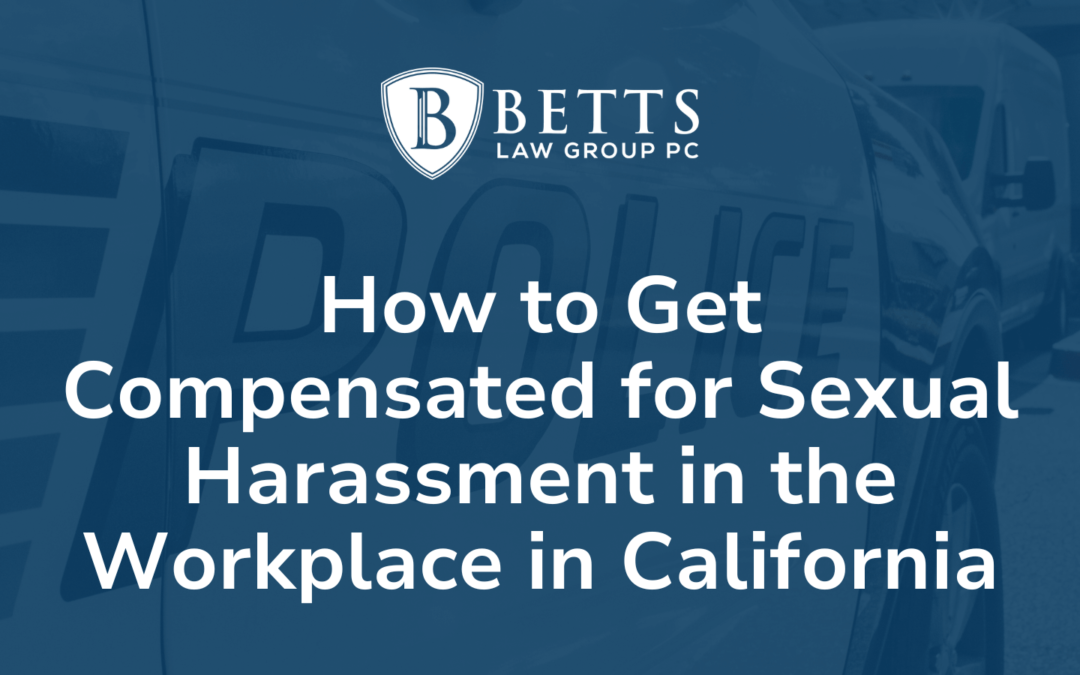Sexual harassment remains a significant issue in workplaces in California as well as across the United States. Despite legal protections in the state, many people who have experienced sexual harassment in the workplace stay silent due to fear of retaliation or being wrongfully terminated. Employees have the right to feel safe in their workspace, and are entitled to justice and compensation if another employee crosses the line.
The experienced California sexual harassment attorneys at Betts Law Group have years of experience dealing with cases involving sexual harassment in the workplace. We can help you understand your rights under California labor and employment laws and fight for compensation if you have been harassed by supervisors, co-workers or other colleagues.
What Is Workplace Sexual Harassment?
Workplace sexual harassment can encompass any unwelcome sexual advances, requests for sexual favors, or any other conduct of a sexual nature that creates a hostile or offensive work environment. The conduct does not have to be motivated by the harasser’s sexual desires to be sexual harassment.
Sexual harassment can be perpetrated by anyone, regardless of gender, and may involve individuals of the same sex. The harasser could be a supervisor, a supervisor from another department, a co-worker, an agent of your employer, or someone else associated with the company who isn’t an employee.
The key element is that the behavior must be unwelcome. The victim doesn’t have to be the direct target; even bystanders or co-workers affected by the conduct can be impacted. You can file a claim for sexual harassment without having suffered economic loss or being fired.
This behavior can manifest in various forms, including:
- Quid pro quo harassment: Any action that implies that an employee’s job security or a related employment issue is contingent upon them providing sexual favors or complying with sexual demands. The contingent benefit could be promotions, raises, favorable schedules, but something that is related and being offered that the employee believes the harasser is in control of.
- Unwanted physical contact: This can include inappropriate touching, groping, hugging, kissing, or any other physical advance that makes an employee uncomfortable. Even seemingly innocent gestures or touches, if unwanted, can be considered harassment.
- Hostile Work Environment – Sexually suggestive comments or jokes: Creating a hostile work environment by making sexually charged remarks, jokes, or innuendos directed at an individual or group of employees can be considered harassment.
- Hostile Work Environment – Displaying sexually explicit material: Putting up sexually suggestive posters, calendars, or screensavers, as well as sharing inappropriate images or videos, can contribute to a hostile work environment.
- Hostile Work Environment – Cyber harassment: Sending unwanted sexually explicit emails, texts, or social media messages to a colleague constitutes harassment, even if it occurs outside of traditional work hours or the physical workplace.
Hostile work environment claims require the offensive behavior or conduct to be so severe or pervasive that it creates an intimidating and offensive work environment such that the harassed employee is unable to perform their job.
The Process for Filing Workplace Sexual Harassment in California
If your employer has a sexual harassment policy, consider taking the following steps:
- Step One: Document the sexual harassment. This includes any texts, emails, notes or even writing down the comments or innuendos made to you, including when, where and who else may have witnessed the conduct.
- Step Two: Follow the internal complaint procedure of your company.This may involve reporting the harassment to your supervisor, human resources representative, or another individual in your organization. Ask your supervisor, HR representative or management for a copy of the policy if you cannot locate it. Make the report, and confirm it in writing if HR wants to meet in person only.
- Step Three: Contact an attorney that has experience in workplace sexual harassment cases. Employment law and sexual harassment laws are complex, and you don’t have to deal with the challenging legal process on your own. An attorney that has experience in this area can explain your rights, the legal options available to you, and help you navigate the often-confusing legal process.
- Step Four: File a formal complaint with the California Civil Rights Department or Equal Employment Opportunity Commission. This can be done online, by mail, or in person. The CRD is the state agency responsible for enforcing laws against discrimination and harassment in the workplace, including sexual harassment and the EEOC is the Federal Agency. You should consult with attorneys before doing so as rights may be waived if done incorrectly.
How a California Lawyer Can Help with Your Sexual Harassment Case
Consulting an attorney is the best way to ensure you understand your rights and options in your specific circumstances. An attorney that has worked on workplace sexual harassment cases can provide personalized guidance, making sure you fully understand your rights and the available legal avenues in your unique situation. They can help you navigate the legal process, gather evidence, and advocate for your best interests, which can empower you to make informed decisions.
Contact Betts Law Group Today!
If you’ve experienced sexual harassment in the workplace, contact Betts Law Group to determine your options. We have an in-depth understanding of California’s labor and employment laws and can help you get the compensation you deserve.
If you have been sexually harassed by supervisors, co-workers, or colleagues, we are here to help you understand your rights and fight for the compensation you deserve.





